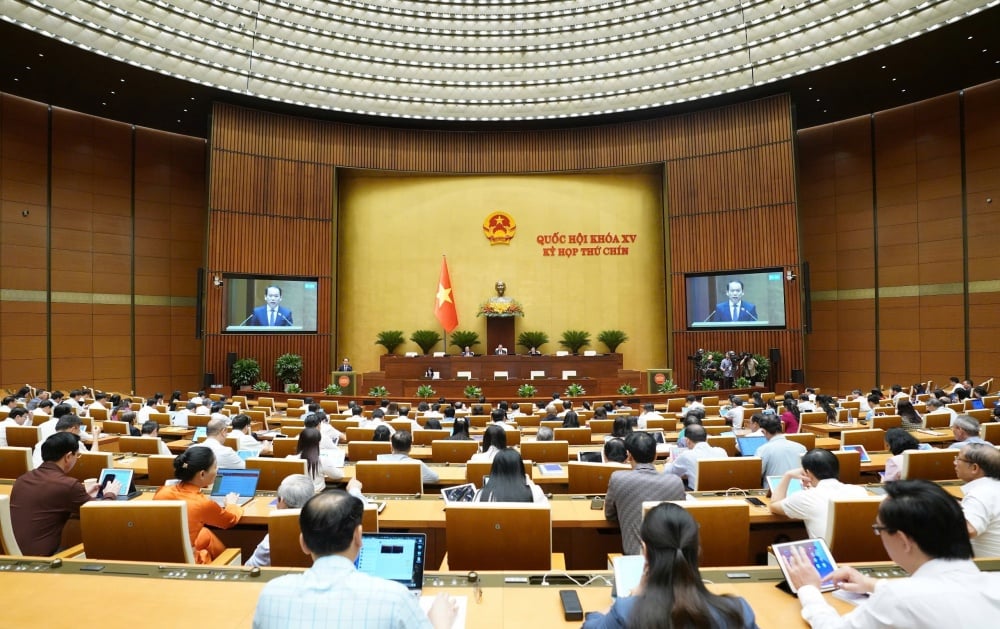 |
| Scene from the meeting |
Improving the legal framework and promoting the private economy .
The draft Law amending and supplementing several articles of the Enterprise Law was developed to institutionalize the Party's and Politburo 's guidelines, address shortcomings in the current law, and meet international agreements to which Vietnam is a signatory. National Assembly deputies emphasized that amending the law is necessary to create momentum for the development of the private sector, especially in the context of Politburo Resolution 68, which aims to reduce administrative processing time, legal compliance costs, and business conditions by at least 30% by 2025.
Delegate Nguyen Viet Ha from Tuyen Quang expressed her agreement with the necessity of amending the law, emphasizing that the draft needs to include provisions of Resolution 68, especially the principle that business rights can only be restricted for reasons of national defense, national security, social order and safety, social morality, environment, and public health. She proposed reviewing laws and sub-laws to ensure that prohibited business sectors are clearly defined in the law, avoiding situations where sub-laws restrict the business rights of enterprises. She also suggested shifting the management of business conditions from licensing and certification to the publication of business conditions and post-inspection, aiming to reduce barriers related to sub-licenses, saving businesses time and costs, thereby promoting market entry and efficient operation.
Sharing this view, delegate Pham Trong Nghia from Lang Son emphasized that the regulations on beneficial owners in Clause 6, Article 217 of the draft need to be clearer and more specific to ensure feasibility and minimize compliance costs. According to him, entrusting the Government with detailed regulations could create difficulties in implementation immediately after the law comes into effect, as businesses will face obstacles in identifying the beneficial owners. He proposed adding basic criteria directly to the law, such as individuals directly or indirectly owning 25% or more of the charter capital, or having the right to control decision-making through voting or authorization contracts, to make it easier for businesses to identify and declare information.
Delegate Do Duc Hien from Ho Chi Minh City focused on the issue of determining the market value of capital contributions in the draft. He proposed clarifying the methods of price determination, including average price, price agreed upon between the seller and the buyer, or price determined by an appraisal organization. He noted that if these three methods yield different results, a preferred method should be clearly defined to ensure consistency and transparency, avoiding confusion in practical application.
Expanding the pool of participants in business management and operations.
One of the highlights of the draft law is the amendment to point b, clause 2, Article 17, allowing officials at public higher education institutions to participate in the management and operation of businesses established or co-established by those institutions, with the aim of commercializing research results. This regulation is considered a step forward in encouraging scientific research and practical application, but delegates believe that the scope needs to be expanded to better align with practical realities and Resolution 57-NQ/TW on the development of science, technology, and innovation.
Delegate Duong Khac Mai from Dak Nong province argued that only allowing officials at public higher education institutions to participate in business management is restrictive. He reasoned that many public research institutes and other public educational institutions also have the capacity to conduct research and apply it effectively to social life. He also proposed expanding the scope of those allowed to participate in business management and operation to leverage competitive advantages in the development of science, technology, and digital transformation, in line with the spirit of Resolution 57-NQ/TW, which encourages research organizations and scientists to establish and participate in the management of businesses based on research results.
Representative Nguyen Thi Thu Dung from Thai Binh province emphasized that public vocational education institutions should also be allowed to establish businesses to commercialize research results, especially in the context of financial autonomy. She argued that scientific and technological research and innovation should not discriminate against any particular group, therefore, the regulation in point b, clause 2, Article 17 should be amended to include civil servants at public vocational education institutions. She proposed that civil servants who are employees at these institutions should have the approval of the head of the institution, while civil servants who are managers and heads of institutions should have the approval of their direct superiors, to ensure transparency and practicality.
Simplify procedures, increase transparency.
Besides expanding the scope of stakeholders involved in management, delegates also focused on simplifying administrative procedures and increasing transparency in business management. These proposals aim to reduce the burden on businesses while creating favorable conditions for business operations.
Representative Nguyen Viet Ha from Tuyen Quang proposed removing the requirement for individuals to provide copies of their legal documents for business registration, instead using data from the national population database to reduce notarization time and costs. She also suggested removing the requirement for businesses to notify the authorities of changes to their business registration when amending their charter or the owner's signature, as these are frequent changes in business operations and are already fully regulated by current law. Furthermore, she argued that regulations on business naming should be simplified, as current naming conventions are too complex, leading to many cases of business registration rejection due to oversight.
Representative Le Dao An Xuan from Phu Yen province emphasized that the phrase "other legally valid personal identification documents" in point c, clause 1, Article 1 of the draft law is still unclear. She proposed replacing it with "documents and materials proving identity" to align with the Civil Code, the Law on Civil Status, and Decree 62/2021/ND-CP, facilitating the processing of business dossiers. She also suggested clearly quantifying the criteria for determining "beneficiary owners" and "individuals with the right to control the business" in point d, clause 1, Article 1, such as the right to make decisions on finance, key personnel, or operational strategy, in order to enhance ownership transparency and align with anti-money laundering requirements.
Representative Le Dao An Xuan also noted that the concepts of "termination of operations" and "termination of existence" are currently inconsistent. She argued that some businesses, especially FDI enterprises, may cease operations of investment projects while retaining their legal status. Therefore, she proposed using the unified concept of "termination of existence" to ensure consistency within the legal system. Furthermore, she suggested removing regulations that fall outside the National Assembly's authority, such as the specific content of documents appointing authorized representatives, minutes of Board of Members meetings, or shareholder opinion polls, to avoid overlap and reduce procedural burdens.
Source: https://thoibaonganhang.vn/mo-rong-doi-tuong-quan-ly-doanh-nghiep-dot-pha-the-che-cho-doi-moi-sang-tao-164031.html






![[Photo] Prime Minister Pham Minh Chinh presides over a meeting on private sector economic development.](/_next/image?url=https%3A%2F%2Fvphoto.vietnam.vn%2Fthumb%2F1200x675%2Fvietnam%2Fresource%2FIMAGE%2F2025%2F12%2F20%2F1766237501876_thiet-ke-chua-co-ten-40-png.webp&w=3840&q=75)



























































































Comment (0)